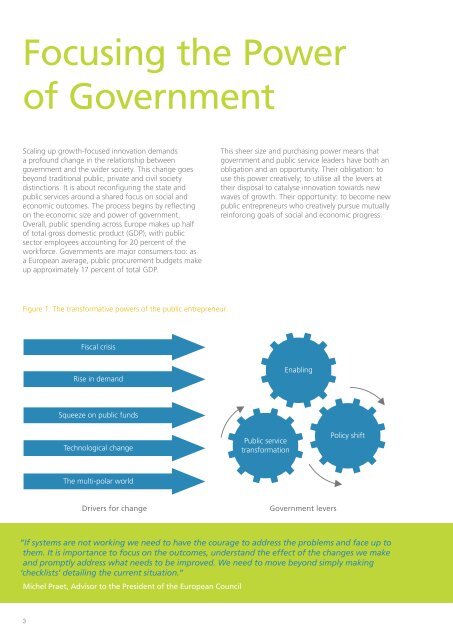Driving Public Entrepreneurship
Driving Public Entrepreneurship
Driving Public Entrepreneurship
Create successful ePaper yourself
Turn your PDF publications into a flip-book with our unique Google optimized e-Paper software.
Focusing the Power<br />
of Government<br />
Scaling up growth-focused innovation demands<br />
a profound change in the relationship between<br />
government and the wider society. This change goes<br />
beyond traditional public, private and civil society<br />
distinctions. It is about reconfiguring the state and<br />
public services around a shared focus on social and<br />
economic outcomes. The process begins by reflecting<br />
on the economic size and power of government.<br />
Overall, public spending across Europe makes up half<br />
of total gross domestic product (GDP), with public<br />
sector employees accounting for 20 percent of the<br />
workforce. Governments are major consumers too: as<br />
a European average, public procurement budgets make<br />
up approximately 17 percent of total GDP.<br />
Figure 1. The transformative powers of the public entrepreneur<br />
Fiscal crisis<br />
Rise in demand<br />
Squeeze on public funds<br />
Technological change<br />
The multi-polar world<br />
This sheer size and purchasing power means that<br />
government and public service leaders have both an<br />
obligation and an opportunity. Their obligation: to<br />
use this power creatively; to utilise all the levers at<br />
their disposal to catalyse innovation towards new<br />
waves of growth. Their opportunity: to become new<br />
public entrepreneurs who creatively pursue mutually<br />
reinforcing goals of social and economic progress.<br />
<strong>Public</strong> service<br />
transformation<br />
Enabling<br />
Drivers for change Government levers<br />
Policy shift<br />
“If systems are not working we need to have the courage to address the problems and face up to<br />
them. It is importance to focus on the outcomes, understand the effect of the changes we make<br />
and promptly address what needs to be improved. We need to move beyond simply making<br />
‘checklists’ detailing the current situation.”<br />
Michel Praet, Advisor to the President of the European Council<br />
3
















